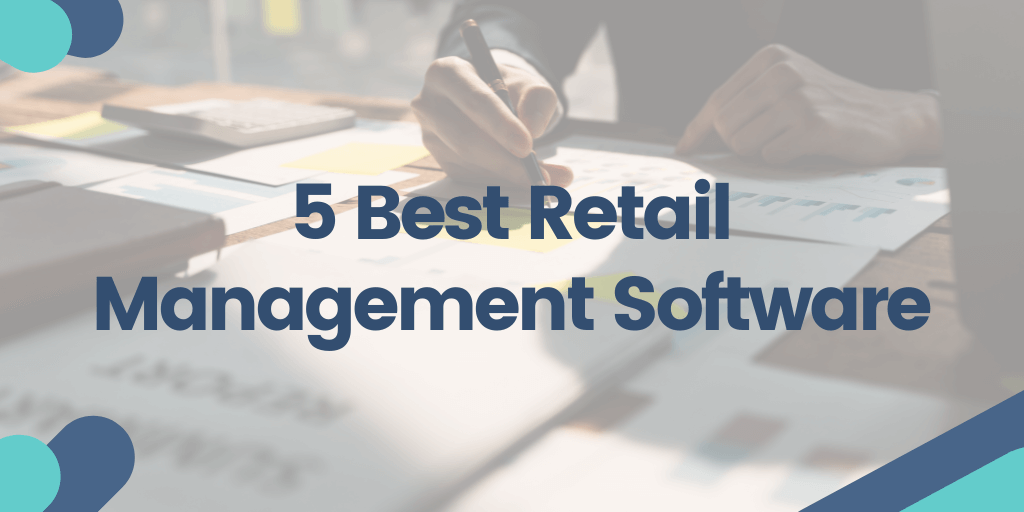Meta Description: Discover the best retail management software solutions for 2024 to run your stores seamlessly, enhance customer experience and grow revenue.
In the rapidly growing retail industry, retail stores need to optimize store processes, automate manual tasks, and ensure seamless customer experience to gain a competitive edge. Hence, many retailers are looking for the best retail management software and complementary Business Central development services to solve all of these requirements.
Retail management software is a crucial tool that supports all core processes of retailing from point of sale (POS) system, customer relationship management (CRM), employee management to supply chain management, reporting and analytics integrations, etc.
Investing in retail management software is a good way to improve the business management efficiency, save time and cost, create accurate records, increase customer satisfaction and staff happiness, and boost smarter business decisions.
With numerous retail management systems available on the market, you might find it hard to decide the optimal choice for your business.
This article will explore the 5 best retail store management software solutions to streamline your store operations and boost profitability. Keep scrolling to learn more!
What is Retail Management Software?
Retail management software (RMS), or retail management system software, refers to specialized digital systems to facilitate and manage retail operations.
An ideal retail management software can encompass various functionalities, including:
- POS
- Return management
- Shipping management
- Inventory management
- Demand forecasting
- Order fulfillment
- Multiple locations
- Warehouse management
- Purchasing/Vendor management
- Employee management
- Accounting/Finance management
- CRM
- Rental management
- Reporting and analytics
In today’s highly dynamic business era, retailers should utilize well designed retail planning software to optimize their everyday operations and guarantee competitiveness.
However, there isn’t any all-in-one retail management software on the market that can take charge of all of the above tasks. This is because retailers only need certain retail management software’s features to run their stores.
Then retailers can integrate retail systems with other tools to meet particular operational requirements.
Top 5 Best Retail Management Software
To help you make an informed decision, our team has assessed and selected the top 5 best software for retail business, based on 5 main criteria: key features, pros, cons, integration capabilities, and pricing structure.
#1. Magestore
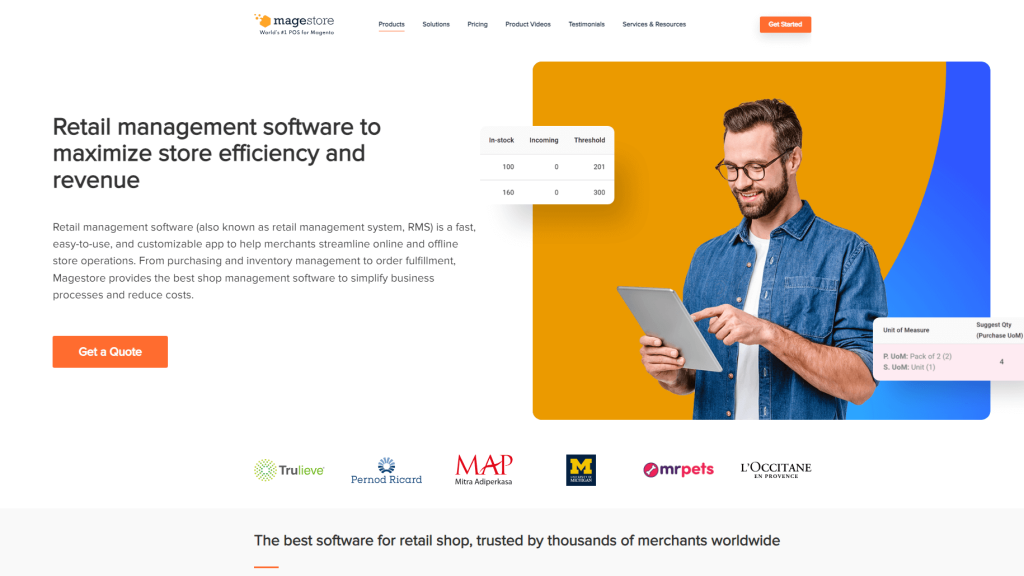
Magestore is an advanced POS software that can carry out both frontend and backend tasks such as managing inventory, forecasting demand, handling purchasing, completing fulfillment, etc. With Magestore retail management software, you can centralize all data between online (eCommerce sites, marketplaces) and offline (physical stores, popup stores) channels into a single platform in real time, speed up your system, and reduce cost.
Magestore RMS system is perfect for growing businesses of all sizes. It’s compatible with all devices with a web browser, such as desktops, iPads, and tablets. Built on the eCommerce platform, this system can save you a lot of setup and maintenance cost. Magestore RMS also allows unlimited users and flexible permission management without any extra fees. You can also customize your system and integrate more functions to meet your business requirements.
If you are using Magento or Shopify platforms, Magestore is for you.
Key features:
- Omnichannel POS
- eCommerce management (Magento & Shopify)
- Inventory management
- Demand forecasting
- Order fulfillment
- Multi locations
- Return management
- Purchasing management
- Employee management
- Reporting and analytics
Integration capabilities:
- Payment gateways
- Shipping management
- Accounting/financial management
- CRM
- ERP software
Pros:
- Compatible with all devices
- Suit businesses of all sizes
- Affordable and reliable
- Easy customization
- Transparent services and policy
- Various customization options
Cons:
- High tech codes, require complicated implementation
Pricing:
- Custom price based on number of stores, support level, and complexity of solution.
- No hidden costs, accept split payments
- Refundable for POS license
#2. NetSuite
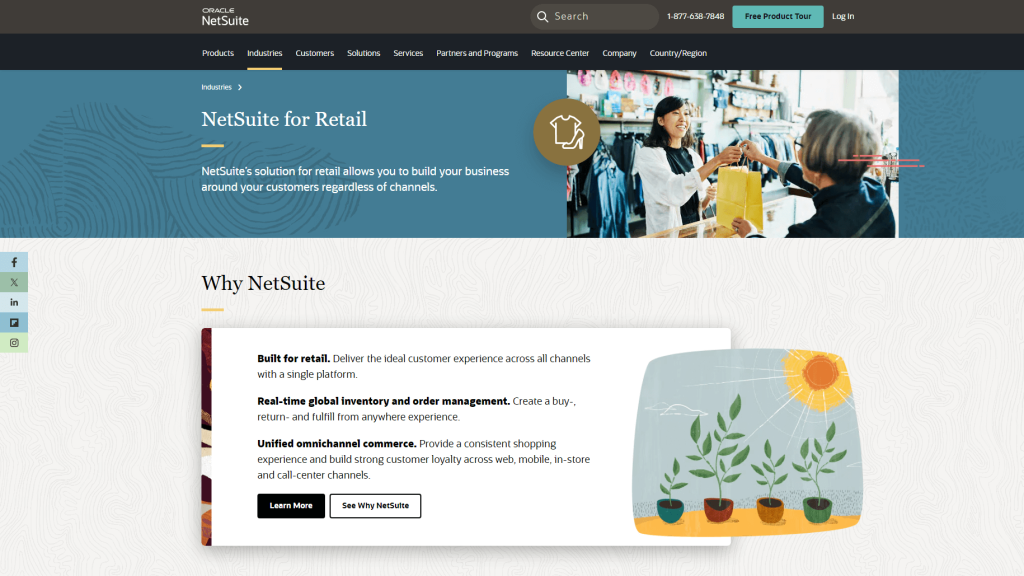
The second name in the top retail management system is NetSuite Enterprise Resource Planning (ERP) system. It features both a warehouse management system and accounting software for retail business. NetSuite allows retailers to integrate eCommerce, POS, order management, and back-office functions under a single platform.
NetSuite is marketed to fit startups, small-sized, and mid-sized companies to automate tasks and unlock real-time insights into their operational efficiency and financial performance. However, implementing NetSuite ERP requires professional employees with specialized knowledge and budget for add-ons, which are often challenges for smaller enterprises. To manage these substantial implementation costs and ongoing operational expenses, many growing retail businesses turn to Ramp’s high-limit business cards for the financial flexibility they need during their technology upgrade process.
Besides, this ERP software doesn’t include a built-in retail POS system. Instead, NetSuite offers a separate product called Oracle NetSuite POS to integrate with the NetSuite ERP platform. Its license cost is also rather high for small businesses.
NetSuite is generally a complicated system with rich features and comes with the need for extra resources for customization.
Key features:
- Accounting practice management software
- Financial management
- Global business management
- Enterprise performance management
- Inventory management
- Order management
- Supply chain management
- Warehouse management
- Procurement
Integration capabilities:
- POS
- CRM
- Need connectors to integrate with eCommerce platforms
Pros:
- Scalability
- Comprehensive ERP features
- Cloud-based infrastructure
Cons:
- Unexpected error messages
- Lack a fixed pricing structure
- Implementation fee for first-time users
- Extra cost for integration: licensing fees, outsourcing it development, APIs and connector cost
- Accessibility constraints for small enterprises
- Customer support hours limited for regular users, additional charge for 24/7 support
Pricing:
- $999/month for the license
- $99/month for a user
- 14-day free Trial
You might be interested in: Branding distribution: Key components
#3. Square
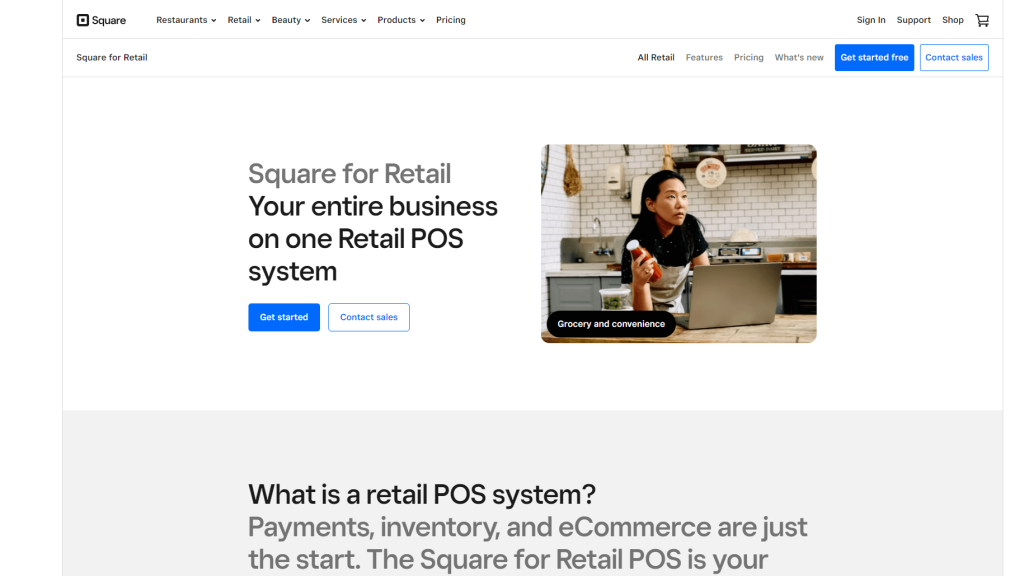
Square for Retail joins the list as best retail task management software that makes business operation easier. It provides cloud-based inventory management, sales management, invoicing, and payment processing.
Square retail management POS software can automatically build customer profiles, tracking purchase history and customer information. However, advanced features like email marketing, text messaging marketing, and loyalty programs require extra pay.
Key features:
- POS
- Inventory and catalog management
- Online selling
- Payments and checkout
- Order management and fulfillment
- Reporting
- Customer management
- Staff management
Integration capabilities:
- QuickBooks Online
Pros:
- Transparent pricing
- Free plan available
Cons:
- Loyalty, rewards, email, and marketing not included in package plans
- Limited functionalities in free plan
- High fees for larger businesses
- Unavailable on Android devices
- Requires internet connection
Pricing:
- Paid plan starts at $89/month/location
- Free 30-day trial period
You should read: Tips to omnichanel marketing strategies
#4. Lightspeed Retail
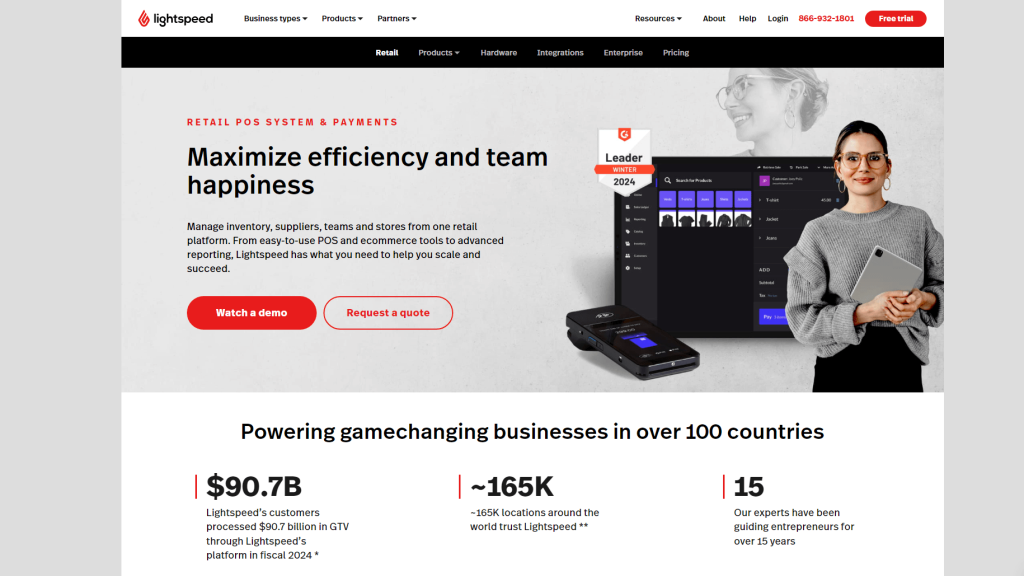
Lightspeed Retail is among the best inventory management software for retail stores that helps save your time with general shop running tasks. It can perform powerful features such as sales analytics and reporting; inventory management, and employee management. By simplifying time-consuming tasks, Lightspeed retail management software allows you to focus on your customer experience and business growth.
As it’s a cloud-based POS system, you can access Lightspeed anytime, anywhere, with any device, and via any web browser. However, the downside is when you no longer pay for Lightspeed service, you can’t get access to your sales data any more.
Lightspeed Retail suits retail stores of small to medium size.
Key features:
- POS
- Registers
- Inventory management
- Access supplier catalogs
- Built-in Lightspeed eCommerce
Integration capabilities:
- ERP software
- Accounting
- Staff management
- Payment
- Shopify, BigCommerce, and WooCommerce
Pros:
- Variety of integration capabilities
- 24/7 chat support
Cons:
- Expensive compared to some other competitors
- Integration features not included in basic plan
- Higher cost for advanced customization and scalability
- Undisclosed charge for third-party processing
- 24/7 phone support only available in plus plan
- Lightspeed eCommerce and eCommerce integration functionality need improvement
Pricing:
- Monthly billing: starting from $109/month
- Annual billing: starting from $89/month
- 14-day free trial
#5. NCR Counterpoint
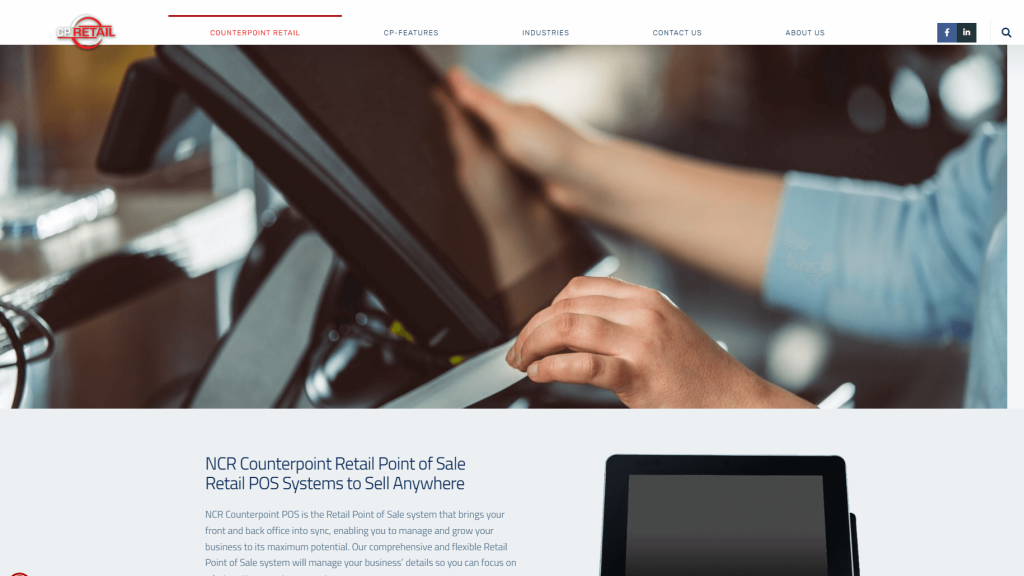
NCR Counterpoint is considered one of the best retail management system software solutions available for several reasons. It syncs the front and back office, assisting you in managing your business, so you can focus on your customers.
Listed as one of the best retail inventory management software solutions, NCR Counterpoint provides inventory control, mobile POS, order management, etc. Also, you can integrate NCR Counterpoint with NCR Customer Connect - a retail marketing platform - to connect with your customers, increase customer loyalty and sales.
This software system is designed for specialty retailers across various industries, including garment, gardening, sporting equipment, liquor, etc.
Some shortcomings may include implementation cost, training cost, and compatibility with existing hardware and system.
Key features:
- POS
- Inventory management
- Customer lookup
- Item lookup
- Order management
- Physical count
Integration capabilities:
- Wholesale ERP
- NCR Customer Connect
Pros:
- Good customer service
- Secure, easy, fast card processing
Cons:
- Not one-time payment
- Limited industry-specific features
- Software sometimes crashes when minimized or hidden
- Depend on Internet connectivity
Pricing:
- By quote
- No free trial
Conclusion
So far, we’ve looked through some of the best retail management software to streamline store operation and boost business growth. A suitable RMS can make a big difference between a thriving business and a struggling one. You should compare thoroughly, consider your specific requirements and budget to choose the strongest match for your shops.
For example, Magestore and NetSuite stand out as top-tier options with manifold features and capabilities. Magestore is an omnichannel POS solution tailored for businesses using Shopify and Magento, so you don't need to pay extra for an integration. Magestore can also integrate with ERP software like NetSuite, Microsoft Dynamics or SAP.
On the other hand, NetSuite is an ERP solution that provides accounting, financial management, and enterprise performance management features, but it doesn't manage fronend tasks and requires a third-party app to connect with eCommerce platforms.


